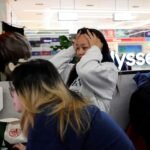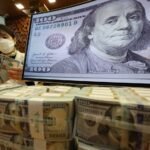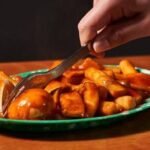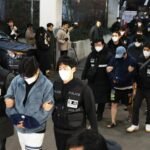
South Korea is considering introducing production tax credits for domestic companies hit by US tariffs, in a move analysts describe as a de facto subsidy to cushion losses as trade talks with Washington drag on.
According to government and industry sources on Wednesday, the Ministry of Trade, Industry and Energy has been consulting with automakers, including Hyundai Motor Co. and Kia Corp., on the scale of expected damage from the US tariff hikes and the potential relief that could result from a new domestic production incentive scheme.
The Ministry of Economy and Finance commissioned a study earlier this month to develop measures to provide tax support and ensure domestic production competitiveness.
The study will start next month, sources said.

If enacted, the measure, dubbed by policymakers as a “Korean IRA” in reference to the US Inflation Reduction Act, would refund a portion of corporate tax for sales of 12 designated national strategic technologies, including electric vehicles, semiconductors, hydrogen and advanced biotech.
AUTOMAKERS STAND TO GAIN THE MOST
Analysts said the auto sector would stand to gain the most.
Hyundai and Kia are forecast to sell 130,000 EVs domestically this year.
If a per-vehicle credit is set at 2 million won ($1,450), the two companies could receive about 260 billion won in relief, partially offsetting the losses of 1.6 trillion won they incurred in the second quarter after Washington imposed a 25% tariff on imports of Korean vehicles.

Analysts expect the scheme to boost not only cars but also domestic production of other high-tech goods such as displays, robots and batteries.
“The Korean IRA would mitigate tariff damage and encourage companies to keep investing at home,” said an industry executive. “Implementation speed will be crucial as the tariff burden keeps mounting.”
Production tax credits were a campaign pledge by President Lee Jae Myung, who highlighted them during visits to Hyundai’s Asan plant and chipmaker SK Hynix Inc.’s Icheon campus.
The proposal, however, was sidelined from this year’s tax reform package announced earlier amid concerns about falling tax revenues. It has been revived under pressure from the escalating trade dispute.

A presidential official said, “We are preparing a range of support measures for (domestic) companies, in addition to those already announced.”
PROTRACTED SEOUL-WASHINGTON TARIFF TALKS ‘UNDESIRABLE’
National Security Adviser Wi Sung-lac on Wednesday struck a cautiously optimistic tone on tariff negotiations with Washington.
“Tariff talks shouldn’t drag on, but what matters is the substance of any agreement,” he told reporters. “Any deal should be feasible, sustainable and able to protect our national interest.”
He added that: “The differences now are over details, not fundamentals. I do not believe a settlement is impossible, though I cannot say when it will come.”

In July, Seoul and Washington reached a broad accord to lower 25% reciprocal tariffs on cars and other goods to 15% in return for Korea’s commitment to invest $350 billion in the US.
The two sides have been in talks on the makeup of the investment package, profit sharing and other details. The talks, however, made little progress amid disputes over the structure, funding and how to handle returns from investments.
Last week, US Commerce Secretary Howard Lutnick said that Korea should either accept a bilateral framework trade deal struck in July or face steep tariffs, amid an impasse in negotiations to work out specifics of the agreement.
Regarding the final signing of the US-Korea trade deals, Korean President Lee said that Korea “will sign if it is good, but why sign if it is not in our interest?”
By Hyung-Kyu Kim, Jeong-Min Nam and Ri-Ahn Kim
khk@hankyung.com
In-Soo Nam edited this article.















